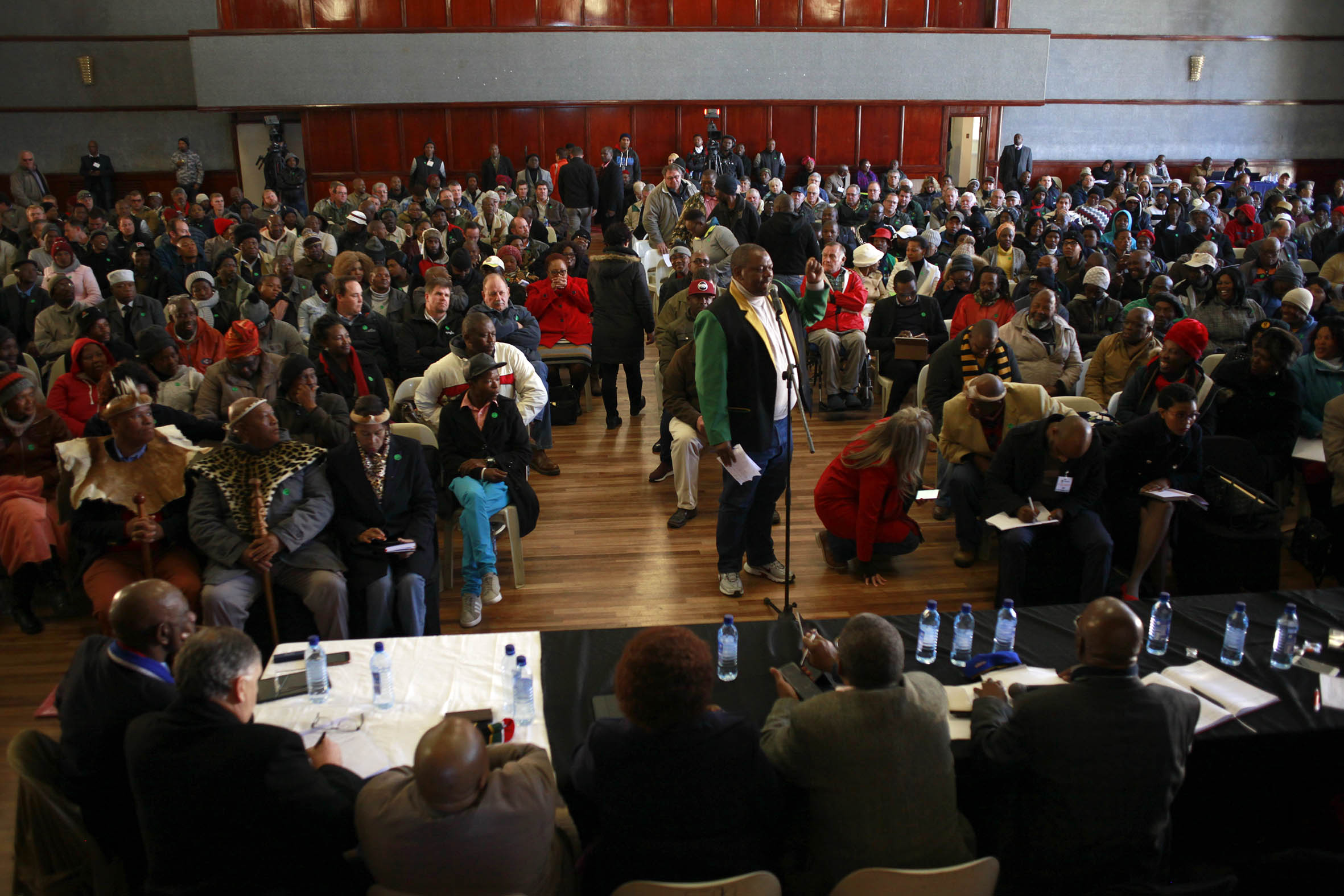During the hearings in Welkom on land expropriation without compensation
Read the Mail & Guardian’s full coverage of the constitutional amendment hearings here.
Lefa Moshouyane would not leave the Ferdie Meyer Hall until the very end of Tuesday’s proceedings. He says he wanted to hear what every person had to say because “this is very important. This is a burning issue.”
Moshouyane was among the first to address the constitutional review committee at the Welkom leg of the land hearings in the Free State — his slight figure appearing shrunken under the hall’s high ceiling, incongruously adorned as it was with nine crystal chandeliers.
The 62-year-old, like many others in the seemingly endless line of people eager to have their say, expressed his support for the amendment of section 25 of the Constitution to allow for the expropriation of land without compensation. Moshouyane’s plea before the committee was forthright: “I want my land back.”
This was the overwhelming sentiment in the packed Ferdie Meyer Hall, which, despite its staggering size, overflowed with the sounds of approval — applause, whistling, ululations.

(Oupa Nkosi/M&G)
Inevitably, dissent expressed by a relatively small cohort of white farmers caused the room to at times collectively rise from plastic chairs in protest. But a second rift in the hall was exposed by the floor’s preoccupation with local political squabbles.
The divisive character of Matjhabeng municipality mayor Nkosinjani Speelman, decked out in an ANC blazer, quickly became a target of the region’s waning confidence in the ruling party.
Braving the ire, he declared to the committee: “The dignity of the black people will not be restored until the land is given back.”
But over his submission hung the Economic Freedom Fighters’ recent motion of no confidence in Speelman and the municipality’s R2-billion debt to Eskom and Sedibeng Water.
Igor Scheurkogel, the founder of community organisation the Power of One, lambasted the mayor’s “failures”, to a chorus of incredulous heckling and laughter.
Unmoved by the waves of agreement and dissent sweeping through the crowd, Moshouyane sat listening, his greying beard slightly tilted towards the sky.
Despite occupying a small room in his cousin’s house on the edge of Thabong township, Moshouyane, a musician, regularly refers to himself as homeless — as the memory of lost familial land has frustrated his sense of belonging. “They say a rolling stone gathers no moss,” he jokes after the hearing.
A member of the Barolong clan, Lefa’s grandfather Petros Moshouyane came to own a piece of land between Excelsior and Thaba ’Nchu — a small town east of Free State’s capital, Bloemfontein.
His family, Moshouyane says, were driven off their land by white farmers. “If you go there now, the farm is still named after us. All the people there, they will tell you, they still call it after the name of our ancestors,” he says. “When the grandchildren pass by the land, they point and say to their friends, ‘This used to be our ancestors’ land.’ ”
He recalls stories of how his father, Mere Piet Moshouyane, became politicised through his friendship with Dr James Sebe Moroka, a descendant of the Moroka chieftains in Thaba ’Nchu.
Officially established in 1873, the population of Thaba ’Nchu grew following the 1913 Natives’ Land Act, which confined chiefdoms to small reserves.
Moroka was involved in the resistance against the 1936 Natives Trust and Land Bill, which sought to limit black ownership of land outside the reserves.
Mere Piet Moshouyane’s participation in local resistance to the laws, his son says, saw him forced by the authorities to Paarl in the Western Cape, where Lefa and his siblings were born.
Moshouyane senior joined the Azanian People’s Liberation Army, then known as Poqo, the military wing of the Pan Africanist Congress. In 1962 Poqo was implicated in an armed uprising in Paarl, though Lefa Moshouyane doesn’t mention this. The family, he says, moved to Kuruman in the Northern Cape in 1964.
A favourite of his father and his last living son, Lefa Moshouyane insists Mere Piet was poisoned and killed two years later for fighting to regain his land.
“He fought for freedom, but that freedom was never found … I’m not free, because I don’t have anything; I don’t have land, I don’t have a house,” Moshouyane says, motioning to the cramped room he sleeps in. “What freedom can I claim if my situation is like this?”
Of the new guard advancing the call for land, Moshouyane is sceptical. “You cannot say the EFF can do this because they have never been in power. But I will give credit to them for fighting for what is right.”
Many who addressed the committee during the land hearings in Welkom started by saluting the EFF — represented in the city by the party’s chief whip Floyd Shivambu — for calling for the amendment to section 25 in Parliament.
Though this renewed action has given Moshouyane hope, he seems resigned to an understanding that he will never live on his family’s land.
“It’s not all about me, because I can die tomorrow,” Moshouyane says. “I just want things to happen for the coming ones.”